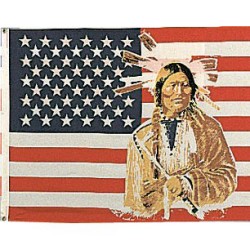Native American Indian Tribes Explore Online Gaming Options

Gaming isn’t new to Native American culture, and in order to help promote economic self-sufficiency amongst the tribes the Indian Gaming Regulatory Act was passed by Congress in 1988, recognizing “the right of Indian tribes in the United States to establish gambling and gaming facilities on their reservations as long as the states in which they are located have some form of legalized gambling”.
Expansion of Indian casinos across US
Indian casino operations seem to be expanding almost on a daily basis across the US, and almost a quarter of a century later there are currently 460 tribal gaming venues spread out across 28 states, with the Indian gaming industry in 2012 generating a massive $27.9 billion in revenues, up by 2.7% compared to the previous year. As of yet, however, none of these casinos offer real-money online gambling.
Now, however, many American Indian tribes are exploring the possibility of introducing Internet gambling, a global industry which currently generates around $30 billion of revenue each year. Americans account for $4 billion of that total, which is predicted to rise to more than $7.4 billion by 2017, representing roughly 30% of the global internet gambling market.
Currently, only Nevada, Delaware and New Jersey offer regulated online gambling in the US, with a Gambling Compliance report predicting at least a further 10 states seriously considering internet gambling bills in 2014. One of those states is California, the USA’s most populous state with 38 million people, and therefore representing the greatest potential of all America’s regulated online gambling markets.
California at forefront of Indian online gaming efforts
In 2011, Indian casinos in California generated $6.9 billion in revenues, representing 25% of the tribes total casino revenues nationwide, with $387 million then going to the state as taxes.
Not surprisingly, California has also found itself at the forefront of Indian gaming aspirations, and by the end of this year, the Alturas Indian Rancheria Tribe is expected to launch the USA’s first Native American internet wagering effort. Meanwhile, tribes in other states are also preparing their own online gambling strategies, including Oklahoma where online gambling is not permitted, and as Stateline reporter Pamela M. Prah, wrote recently:
“The Cheyenne & Arapaho Tribes in Oklahoma are pressing forward with a site that will target gamblers from outside the United States. And the Lac du Flambeau Band of Lake Superior Chippewa Indians in the Midwest is actively preparing for the possibility that more states or the federal government will sanction online gambling sometime soon.”
Tribes divided on whether to allow gambling on reservations
Despite presenting American Indian Tribes with the chance to be part of an online gambling industry worth billions of dollar, many tribes have opposed gambling in general on their reservations, with online gaming also proving to be just as divisive an issue. Those in favour of internet gambling cite expansion as a potential business opportunity that could help alleviate high unemployment and poverty amongst its people. In anticipation of internet gambling, many tribes currently offer free games on their websites.
Conversely, other tribes are concerned internet gambling might not only siphon business away from their existing casinos, but that they could eventually lose further ground in the eventuality of a Federal online gambling bill, or interstate compacts, as they are forced to compete for customers against flashy Las Vegas sites. As tribal nations lawyer Penny Coleman explained soon after the Obama administration opened the way for state-by-state online gambling:
“Now they are concerned that this ruling is going to be the impetus for the federal legislation. They’re worried there’s going to be this big push now. [Tribal leaders] know Nevada doesn’t want to stay within its borders.”
Online gaming to ensure greater sovereignty for tribes
Despite the worries, 2014 will nevertheless prove a landmark year in terms of Indian online gaming as tribal gaming authorities take their first tentative steps into the online gambling industry. Up until now, Native American gaming has proved a life-line in terms of ensuring self-sufficiency and preserving their tribal sovereignty, and by entering the online gambling industry while it is still nascent period, Indian tribes will better be able to carve out a fair share of the Internet gaming pie for themselves.
Equally as important, many Native American tribes may find they cannot afford to lag behind as internet gaming develops further and evolves away from the casino floor onto players’ PCs, smartphones and tablets.










